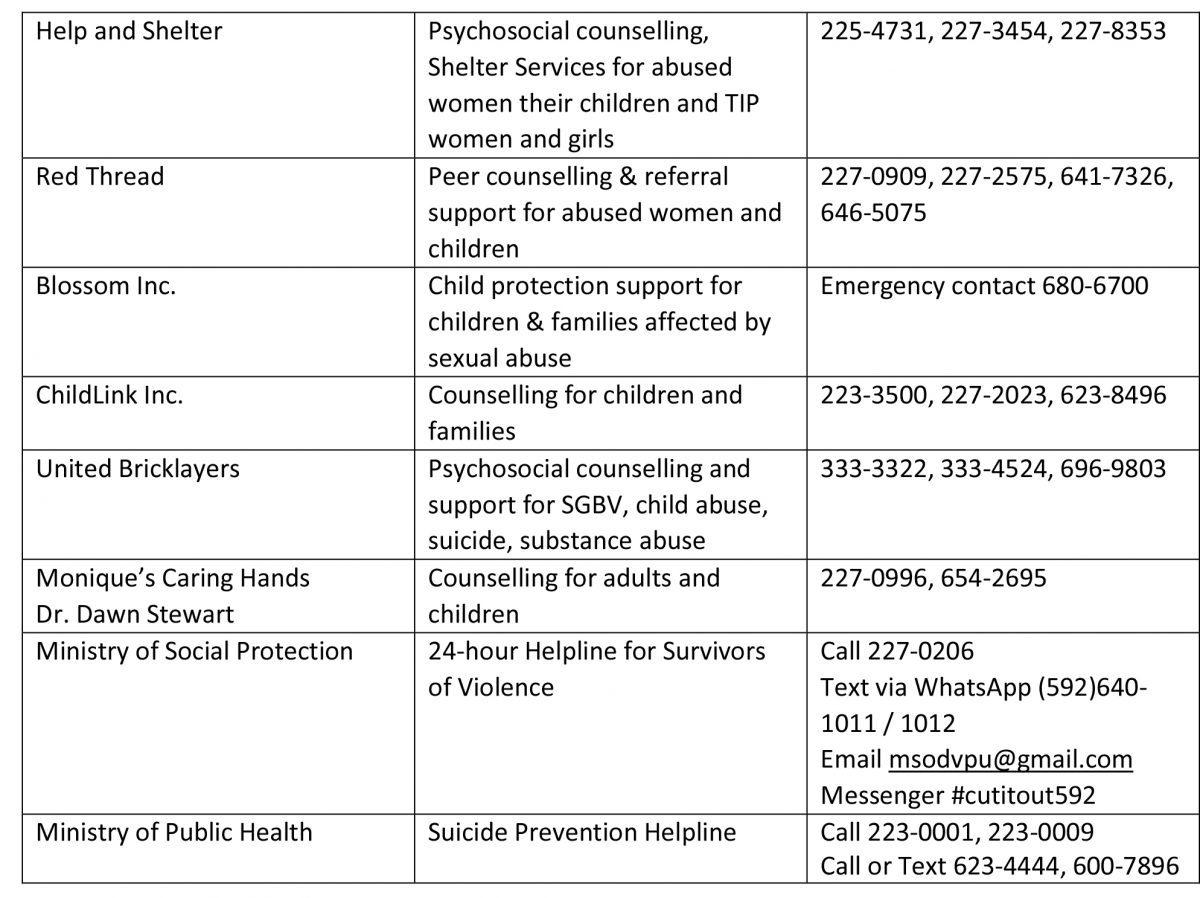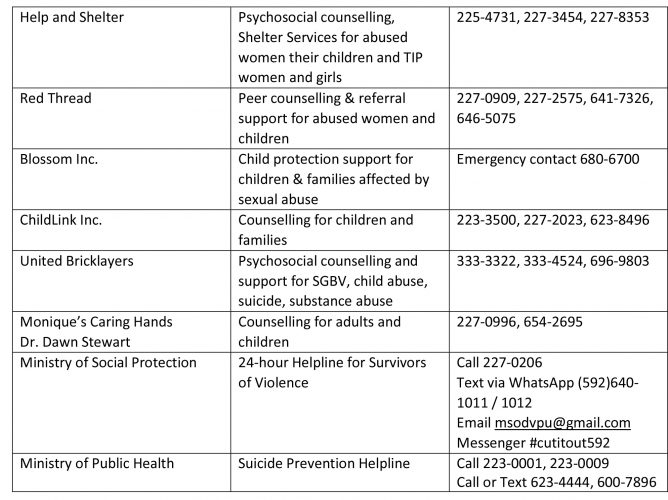
Sireesha Bobbili and Ruth Rodney were UN Women consultants who developed the qualitative research component of the Women’s Health and Life Experiences Survey in Guyana. They collected and analyzed qualitative data from across the country, authored the qualitative report and contributed to the authorship of the primary report.
As governments continue lockdowns and stay-at-home orders to prevent the spread of COVID-19, another global public health crisis is on the rise: violence against women.
Violence Against Women is a Public Health Crisis
Prior to the COVID-19 pandemic, violence against women was already a major public health and human rights issue. According to the World Health Organiza-tion, approximately one in three women (29.8%) in Latin America and the Caribbean have experienced physical or sexual violence by an intimate partner at some point in their lives. In Guyana, a UN Women led study indicated this number is even higher with 38%, or more than one in three women, experiencing at least one act of physical and/or sexual violence in their lifetime. As COVID-19 and stay-at-home measures continue, these numbers will likely increase.
Lockdown and Stay-at-Home Orders Place Women in Dangerous Situations
With public health emergencies like COVID-19, women are placed at an increased risk of violence. Self-isolation and physical distancing have severely restricted people’s movement, therefore more time is spent at home. Being confined to cramped and close living conditions may lead to stress and tension, providing the ideal conditions for conflict to take place and escalate.
For those women who live with partners with a history of physical, mental and sexual violence, COVID-19 orders are placing vulnerable women in extremely dangerous situations. Oftentimes, they are confined with their abuser and are isolated from social networks and resources that they rely on for support and help. As well, since health, law enforcement and social services are consumed with providing care and supports related to COVID-19, help is limited.
Global Increases in VAW during COVID-19
Countries that have adopted stay-at home measures are reporting a surge in the number of calls to domestic violence helplines and shelters. In a recent statement released by UN Women’s Executive Director, Phumzile Mlambo-Ngcuka, requests for help with violence have increased during the COVID-19 pandemic in North America and Europe, in countries such as Canada, the United States, France, Germany, Spain, the United Kingdom and Australia. Channel News Asia has also indicated that Asian countries have reported increases, with Singapore recording a 33% increase in domestic violence calls compared to the same time last year.
Unsurprisingly, Caribbean countries appear to be following a similar trend. Trinidad and Tobago recently reported a drastic increase in the number of domestic violence cases, with twice the number of cases in March 2020 as compared to the previous year. However, this may be partially due to the January 2020 launch of the Gender-Based Violence Unit in the country. Considering that intimate partner violence in Guyana surpasses the Caribbean average, Guyana may unfortunately be creating conditions where violence against women will increase.
The Current Situation in Guyana
In a recent study published by UN Women, the majority of Guyanese women surveyed believed that men are the natural authority and head of the household, while a woman’s primary responsibility is to take care of the home. Somewhat paradoxically, the majority of women also believed that authority and responsibility for the household should be shared between partners. These conflicting gender norms held by Guyanese are at the root of violence against women. Furthermore, we cannot forget the impact of violence on children. In many homes, children experience violence by witnessing their mother’s abuse and are therefore at increased risk of physical and/or sexual abuse and neglect.
COVID-19 Related Orders in Guyana
COVID-19 related orders in Guyana are introducing additional stressors that can impact intimate relationships, leading to increased conflict and arguments. With the recent enactment of emergency measures, a curfew is currently being enforced from 6pm to 6am across the country. Coupled with business closures, job loss, reduced income and decreased access to social networks, many Guyanese are spending the majority of their time at home with significant others and children.
With business closures, reduced hours and job losses looming due to COVID-19, financial resources are limited. Guyanese women are now being tasked to feed their family with little to no money, even though men are typically expected to provide financially for their family. This places additional burden on women.
As well, since Guyanese women are typically expected to take care of the household, they are now also tasked with home schooling their children, as schools have been closed indefinitely. Women are overburdened with ever increasing responsibilities in the home and are under greater scrutiny by their partners. This places women at greater risk for violence, highlighting the need to strategically address gender inequality in Guyanese society.
What Can We Do?
COVID-19 provides a sobering reminder of how interconnected we all are – how our action or inaction may lead to grim consequences for our neighbours. While many may question what impact they can have considering the evolving restrictions to movement and social interaction, there is a lot that can be done.
1. Comply with Guyana’s Emergency Measures
First, complying with Guyana’s emergency measures, such as stay-at-home orders and social / physical distancing, is essential to reduce the spread of COVID-19. It may seem harmless to disregard the current measures put in place, however these practices have been proven to reduce the number of people infected by COVID-19. Over time, new cases will begin to decrease and emergency measures will be lifted or reduced. This has been the experience in Hubei Province, China where the outbreak began.
If emergency measures are disregarded, COVID-19 will continue to infect individuals and stay-at-home orders will continue in Guyana. Businesses and schools will remain closed, leading to massive job losses and sustained unemployment. Food insecurity will rise. The pandemic will wreak havoc on Guyana’s economy. This will directly contribute to increased violence against women for an indefinite period. Therefore, what we do today and the days ahead, may save a countless number of women’s lives.
2. Support Local Initiatives for Families in Need
Second, support local businesses, organizations and concerned citizens that are working together to assist families in need. The Civil Defence Commission has begun coordinating national relief efforts and distributing food hampers. There have also been numerous community initiatives, such as those reported in last week’s diaspora column alongside others like Japarts and Ashiek and Sons Motor Supplies which are also working to provide food hampers for needy families. These efforts are crucial because the call to stay at home is difficult to follow, particularly for those who are self-employed. For example, food vendors and agricultural workers are dependent on daily income earned outside of the home. As a result, stay-at-home orders can have dire effects for their survival as well as their family.
Based on the experiences of other countries that are further along in their COVID-19 trajectories, we know that public and private support will be required by many and must be continuously available. Therefore, supporting local initiatives with financial donations, food and household items as well as feminine hygiene products, diapers and baby formula will ensure hampers are women centred and that families continue to receive the supports they need.
3. Support Local Women’s Organizations
Third, support longstanding organizations that focus on eliminating violence against women in Guyana. Notably, Help and Shelter accepts financial donations as well as food, toiletries and clothing for their shelter. Information about donating can be found on their website. Contact Red Thread on their facebook page to find ways to support their efforts. Additionally, Food for the Poor accepts support for the provision of food and household items to families. For those living abroad, monetary donations to these organizations will assist their efforts. Please consult with the provided links for more information.
4. Do Not Support Businesses that are Overcharging
Fourth, do not support businesses that are increasing prices on basic necessities, such as food and household items. While there are some private businesses that are supporting vulnerable families, others are profiting from the fear of food shortages by overcharging on certain products.
Business owners have a moral responsibility to put people before profits during this crisis. If you are a business owner, understand that this practice contributes to the perpetuation of violence against women. When pandemics are used to gouge citizens of limited funds, it puts unnecessary strain on an already stretched financial situation for many women. As a result, food and household items needed to sustain families and their homes are unavailable, leading to worry, stress and conflict. This can place undue pressure on strained relationships.
Lastly, it is imperative that COVID-19 updates do not drown out messaging condemning violence against women. While our world remains uncertain at this time, the unfortunate reality is that violence against women will continue unabated if we fail to take action and help those in need. Remember, we are all in this together.
If you or someone you know is experiencing violence, speak up, speak out, find support for them:
Please contact the organizations at the numbers provided below.







